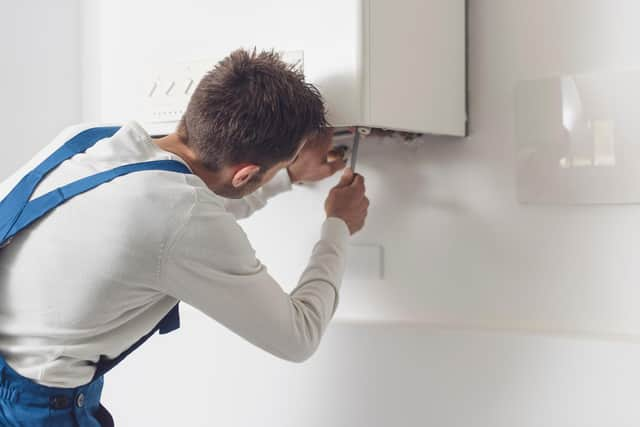Why getting the boiler checked could save you from a financial disaster - Martyn James
Hard as it may be to believe right now, there will come a day in the not-to-distant future where we can leave the umbrellas at home, store the winter coats and go out in the sunshine. Calves will be bared and dust blown off bottles of suntan lotion. Have faith.
Of course, that also means we can finally knock of the heating and start making some serious savings on our energy bills. But don’t flip the switch on a gas boiler or thermostat, then forget about your heating systems.
Advertisement
Hide AdAdvertisement
Hide AdIn the spirit of spring cleaning, now is one of the best times to get your boiler checked and serviced. It may sound like another dull job to add to the ‘to do’ list. But if you forget, it could potentially cost you a fortune.


According to research from Gas Safe Register, well over half of people – 12.4 million – didn’t realise that not having their boiler checked annually could result in a home insurance or warranty claim being rejected. More worryingly, one in ten people actually had claims rejected as a result of failing to carry out contractual requirements like this.
That can be a very expensive mistake. Leaving aside the high cost of rejected claims, an emergency callout can cost a great deal, depending on what’s gone wrong. If your insurance doesn’t cover the emergency, then costs could reach £1,000, or even £2,000 or more.
Unsurprisingly, the research also found that a quarter of people don’t read their insurance policies in full. As I’ve often said in this column, insurance contracts can be full of jargon and hard to understand, so I don’t blame people for this at all! I skim mine but find I get distracted easily. But it is worth familiarising yourself with the things your insurer expects you to do in order to meet the terms of the agreement.
If you’ve lost your policy, give them a call and ask them to email you a copy. You can also ask if the insurer has any recommendations or discounts for registered engineers in your area, along with precisely what you need to have checked to keep your cover valid.
Many of us simply forget to get our heating systems checked out every year when the sun comes out. But it’s dead easy to sort out and it won’t cost much cash at all.
According to Checkatrade, the average cost of getting a gas safety certificate is between £60 and £90, so I’d budget around £80 for the check. Finding a registered engineer isn’t difficult. By law, all gas engineers must be on the Gas Safe Register and you can find ones in your local area by visiting www.GasSafeRegister.co.uk.
During the check, the engineer will test your appliances, to make sure that they’re all working as they should be. This includes checking your boiler pressure and looking to see if the gas is burning properly (a yellowy/orange flame could indicate the presence of carbon monoxide). Bear in mind this is a little different to a full boiler service, which involves checking each component of the boiler.
Advertisement
Hide AdAdvertisement
Hide AdContinuing in the spirit of admitting my many mistakes, when I was talking about gas safety on TV this week I tested my own carbon monoxide detector. To my horror, I discovered it was deader than a dodo (with a thick layer of dust on it).
I was a little horrified that I’d neglected to do something as simple as pressing a button to check it was working. So go on, check yours right now!
If you live in rented accommodation, then your landlord or housing authority is responsible for arranging for a gas safety check. I know a lot of people don’t like to rock the boat with landlords, particularly if they aren’t very good or might be hinting that your rent is due to go up. But don’t forget you can always ask them for the check because ‘your insurer has asked for it’ if you don’t feel comfortable demanding one.
If you’re busy, stick a reminder in your diary right now. Safety first!
Martyn James is a leading consumer rights campaigner, TV and radio broadcaster and journalist. Visit martynjamesexpert.co.uk.
Comments
Want to join the conversation? Please or to comment on this article.